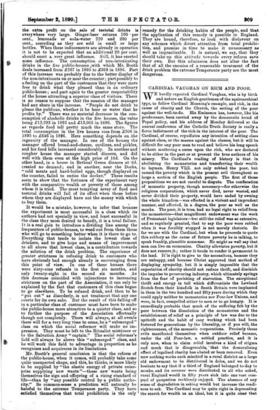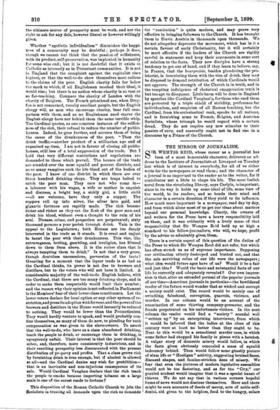CARDINAL VAUGHAN ON RICH AND POOR.
WE hardly expected Cardinal Vaughan, who is by birth and nature an English gentleman of the squirearchical type, to follow Cardinal Manning'a example, and risk, in the cause of charity and the Church, the setting of the poor against the well-to-do. His Eminence has, however, like his predecessor, been carried away by the democratic trend of Papal policy, and his address of Monday delivered at the annual conference of the Catholic Truth Society is really a fierce indictment of the rich in the interest of the poor. The Cardinal, of course, repudiates any intention of setting class against class, or the masses against the classes, but it will be difficult for any poor man to read and believe his long speech without muttering a curse upon the rich, who are declared to be either in the past or at present the true authors of his misery. The Cardinal's reading of history is that in abolishing the monasteries and transferring their wealth to laymen, Henry VIII. not only robbed the poor, but caused the poverty which is the present evil throughout so large a section of the English people. The first of those propositions we are not careful to dispute. The confiscation of monastic property, though necessary—for otherwise the religions corporations, which never died, never wasted, and never divided their property, would have ended by owning the whole kingdom—was effected in a violent and imprudent manner, and affected, in a degree, the poor as well as the monks. The poor, it is true, had no legal right to relief from the monasteries—that magnificent endowment was the work of Protestant legislators—but still the relief was so extensive, and so regularly granted, that to say the poor were robbed when it was forcibly stopped is not merely rhetoric. So - far we are with the Cardinal, but when he proceeds to quote this robbery as the cause of future poverty he is talking, to speak frankly, plausible nonsense. He might as well say that men can live on economies. Charity alleviates poverty, but it does not remove it ; rather it tends to render it permanent in the land. It' is right to give to the necessitous, because they are unhappy, and because Christ approved that method of displaying .sympathy, but it is simply impossible that the expectation of charity should not reduce thrift, and diminish the impulse to persevering industry, which ultimately springs from the fear of perishing of starvation. The exceptional thrift and energy in toil which differentiate the Lowland Scotch from their kinsfolk in South Britain were implanted in them in the two hundred and fifty years daring which they could apply neither to monasteries nor Poor-law Unions, and were, in fact, compelled either to earn or to go hungry. It is exceedingly probable that much of the suffering felt by the poor between the dissolution of the monasteries and the establishment of relief as a principle of law was due to the upthrift and the habit of easy working which had been fostered for generations by the liberality, or if you will, the righteousness, of the monastic corporations. Precisely those evils manifested themselves when outdoor relief became, under the old Poor-law, a settled practice, and it is only now, when to claim relief involves a kind of stigma and much that is disagreeable, ' that the demoralising effect of legalised charity has abated or been removed. Even now nothing works such mischief in a rural district as a large old endowment to be distributed in doles, and we do not hesitate to say that if a third of England belonged to-day to monks, and its revenue were distributed to all who asked, rural England would in fifty years sink into one vast cess- pool of pauperism recklessly enjoyed. The absence of any sense of degradation in asking would but increase the readi- ness to ask. The Cardinal may be quite right in deprecating the search for wealth as an ideal, but it is quite clear that
the ultimate source of prosperity must be work, and not the right to ask for any dole, however liberal or however willingly given.
Whether "egotistic individualism" diminishes the happi- ness of a community may be doubtful ; perhaps it does, though we cannot but think that the passion of selfishness, with its product, self-preservation, was implanted in humanity f )r some wise end; but it is not doubtful that it exists in Catholic as intensely as in Protestant communities. It is not in England that the complaint against the capitalist rises highest, or that the well-to-do show themselves most callous to the claims of the poor. English charity falls far below the mark to which, if all Englishmen reached their ideal, it would rise; but there is no nation whose charity is so vast or so far-reaching. Compare the charity of London with the charity of Belgium, The French priesthood are, when Drey- fus is not concerned, usually excellent people, but the English clergy will, as men who encourage charity, bear full com- parison with them, and as no Englishman need starve the English clergy have not behind them the same terrible whip. The Cardinal quotes, as one concrete instance of the selfish- ness of the rich, their refusal to reduce the number of public. houses. Indeed, he goes farther, and accuses them of being the cause of the drunkenness of the poor, "Then the drink traffic,—another product of a utilitarian age and of organised egotism, I am not in favour of closing all public- houses, still less of a total suppression of the trade, But I hold that very different restrictions and regulations are demanded to those which prevail. The houses of the trade are studded over the most squalid and poorest districts, and as so many vampires suck the life blood out of the bodies of the poor. I know of one district in which there are over three hundred drinking shops, They are traps baited to catch the poor man. They care not who come in— a labourer with his wages, a wife or mother in anguish and distress, a bright boy, a sickly girl, a little child —all are welcome, have they only a copper. The coppers roll up into silver, the silver into gold, and gigantic fortunes are rapidly made. The rich become richer and richer as they eat the flesh of the poor man and drink his blood, without even a thought to the ruin of his soul. Disease, crime, and pauperism are perpetuated; sixty thousand persons a year perish through drink. Vain is the appeal to the Legislature; both Houses are too deeply interested in the trade as it stands, It is cruel and unjust to taunt the poor with their drunkenness. This vice, like extravagance, betting, gambling, and irreligion, has filtered down to them from above. It is the richer class that is always tempting them to drink." Is not that a very gross, though doubtless tinconsoions, perversion of the facts Granting for a moment that the liquor trade is as bad as the Cardinal thinks, its power is not due to brewers and distillers, but to the voters who will not have it limited. A considerable majority of the well-to-do English believe, with the Cardinal, that there are too many drinking shops, and in order to make them respectable would limit their number ; and the reason why their opinion is not reflected in Parliament is the Members' fear of their lower-class constituents, Let the lower voters declare for local option or any other system of re- striction,and press its adoption with fervour. and the power of the brewers and distillers in the House would instantly be reduced to nothing. They would be fewer than the Protectionists. Tney would hardly venture to speak, and would probably con- fine themselves, as many of them do now, to pleading for such compensation as was given to the slave-owners. To assert that the well-to-do, who have as a class abandoned drinking, teach the people to drink, or encourage them in drinking, is egregiously unfair. Their interest is that the poor should be sober, and, therefore, more consistently industrious, and in their resulting prosperity less discontented with the present distribution of property and profits. That a class grows rich by furnishing drink is true enough, but if alcohol is allowed at all—and the Cardinal denies any wish for prohibition— that is an inevitable and non-injurious consequence of its sale. Would Cardinal Vaughan declare that the rich teach the people to smoke because importing tobacco on a large scale is one of the surest roads to fortune?
This disposition of the Roman Catholic Ohuroh to join the Socialists in treating all demands upon the rich as demands for " restitution " is quite modern, and may prove very effective in bringing followers to the Church. It has brought them in Slavic Austria in thousands upon thousands. We do not altogether deprecate the movement, which has in it a Certain flavour of early Christianity, but it will certainly be most effective if the leaders of the Church are rigidly careful in statement and keep their arguments in some sort of relation to the facts. Their new disciples have a strong tendency to get out of hand, and if they learn to believe, say, in France, that the bourgeoisie, besides plundering the pro- letariat, is inoculating them with the vice of drink, they may be disposed to demand retribution of which Cardinals would not approve. The strength of the Church is in truth, and in the tempting indulgence of rhetorical exaggeration truth is but too apt to disappear. Little harm will be done in England by speeches like Cardinal Vaughan's, for those who read them are protected by a triple shield of stolidity, preference for individualism, and suspicion of all Roman teaching, but the Cardinal, from his ecclesiastical rank, speaks to all nations, and is furnishing arms to French, Belgian, and Austrian Socialists, whose triumph he would regard with a certain dread, They do not require any new stimulus to their passion of envy, and assuredly ought not to find one in a discourse by a Prince of the Church.



































 Previous page
Previous page